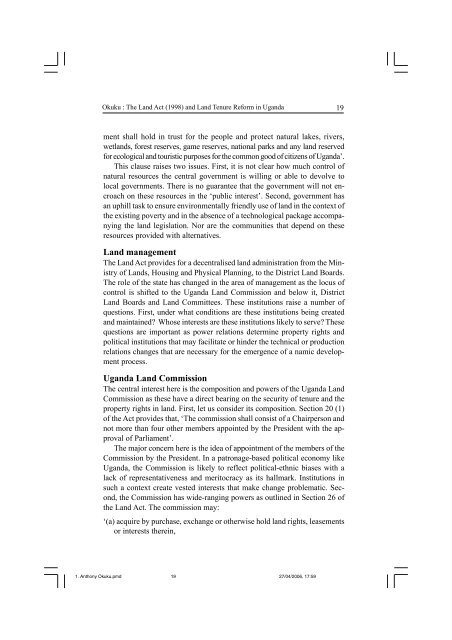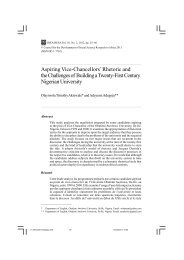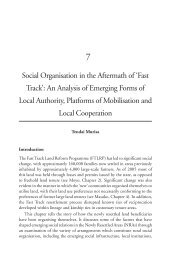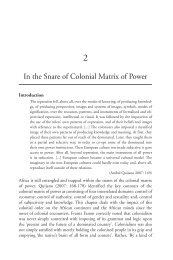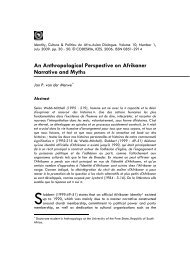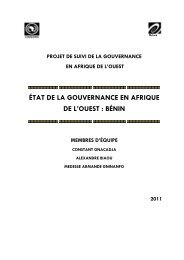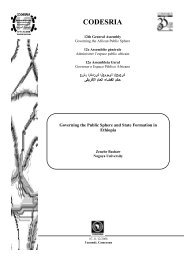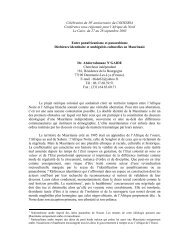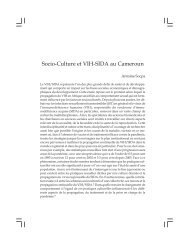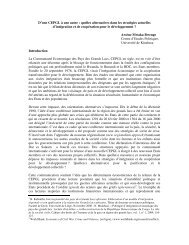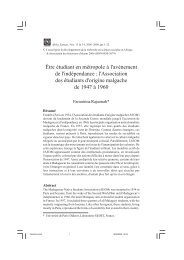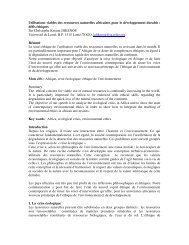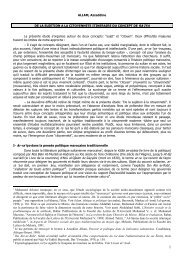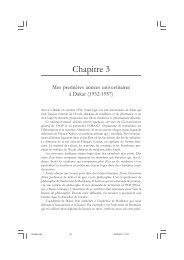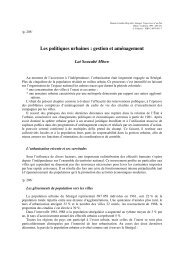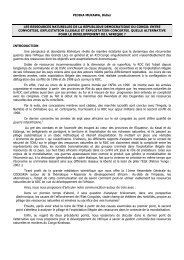and Land Tenure Reform in Uganda - codesria
and Land Tenure Reform in Uganda - codesria
and Land Tenure Reform in Uganda - codesria
Create successful ePaper yourself
Turn your PDF publications into a flip-book with our unique Google optimized e-Paper software.
Okuku : The L<strong>and</strong> Act (1998) <strong>and</strong> L<strong>and</strong> <strong>Tenure</strong> <strong>Reform</strong> <strong>in</strong> Ug<strong>and</strong>a<br />
ment shall hold <strong>in</strong> trust for the people <strong>and</strong> protect natural lakes, rivers,<br />
wetl<strong>and</strong>s, forest reserves, game reserves, national parks <strong>and</strong> any l<strong>and</strong> reserved<br />
for ecological <strong>and</strong> touristic purposes for the common good of citizens of Ug<strong>and</strong>a’.<br />
This clause raises two issues. First, it is not clear how much control of<br />
natural resources the central government is will<strong>in</strong>g or able to devolve to<br />
local governments. There is no guarantee that the government will not encroach<br />
on these resources <strong>in</strong> the ‘public <strong>in</strong>terest’. Second, government has<br />
an uphill task to ensure environmentally friendly use of l<strong>and</strong> <strong>in</strong> the context of<br />
the exist<strong>in</strong>g poverty <strong>and</strong> <strong>in</strong> the absence of a technological package accompany<strong>in</strong>g<br />
the l<strong>and</strong> legislation. Nor are the communities that depend on these<br />
resources provided with alternatives.<br />
L<strong>and</strong> management<br />
The L<strong>and</strong> Act provides for a decentralised l<strong>and</strong> adm<strong>in</strong>istration from the M<strong>in</strong>istry<br />
of L<strong>and</strong>s, Hous<strong>in</strong>g <strong>and</strong> Physical Plann<strong>in</strong>g, to the District L<strong>and</strong> Boards.<br />
The role of the state has changed <strong>in</strong> the area of management as the locus of<br />
control is shifted to the Ug<strong>and</strong>a L<strong>and</strong> Commission <strong>and</strong> below it, District<br />
L<strong>and</strong> Boards <strong>and</strong> L<strong>and</strong> Committees. These <strong>in</strong>stitutions raise a number of<br />
questions. First, under what conditions are these <strong>in</strong>stitutions be<strong>in</strong>g created<br />
<strong>and</strong> ma<strong>in</strong>ta<strong>in</strong>ed? Whose <strong>in</strong>terests are these <strong>in</strong>stitutions likely to serve? These<br />
questions are important as power relations determ<strong>in</strong>e property rights <strong>and</strong><br />
political <strong>in</strong>stitutions that may facilitate or h<strong>in</strong>der the technical or production<br />
relations changes that are necessary for the emergence of a namic development<br />
process.<br />
Ug<strong>and</strong>a L<strong>and</strong> Commission<br />
The central <strong>in</strong>terest here is the composition <strong>and</strong> powers of the Ug<strong>and</strong>a L<strong>and</strong><br />
Commission as these have a direct bear<strong>in</strong>g on the security of tenure <strong>and</strong> the<br />
property rights <strong>in</strong> l<strong>and</strong>. First, let us consider its composition. Section 20 (1)<br />
of the Act provides that, ‘The commission shall consist of a Chairperson <strong>and</strong><br />
not more than four other members appo<strong>in</strong>ted by the President with the approval<br />
of Parliament’.<br />
The major concern here is the idea of appo<strong>in</strong>tment of the members of the<br />
Commission by the President. In a patronage-based political economy like<br />
Ug<strong>and</strong>a, the Commission is likely to reflect political-ethnic biases with a<br />
lack of representativeness <strong>and</strong> meritocracy as its hallmark. Institutions <strong>in</strong><br />
such a context create vested <strong>in</strong>terests that make change problematic. Second,<br />
the Commission has wide-rang<strong>in</strong>g powers as outl<strong>in</strong>ed <strong>in</strong> Section 26 of<br />
the L<strong>and</strong> Act. The commission may:<br />
‘(a) acquire by purchase, exchange or otherwise hold l<strong>and</strong> rights, leasements<br />
or <strong>in</strong>terests there<strong>in</strong>,<br />
1. Anthony Okuku.pmd 19<br />
27/04/2006, 17:59<br />
19


